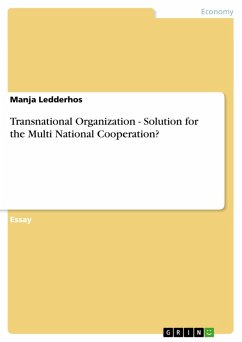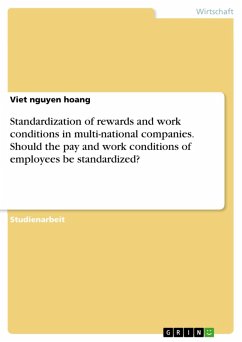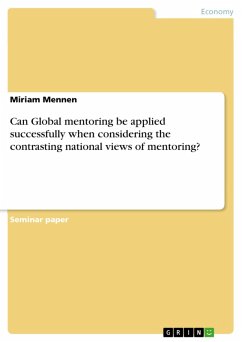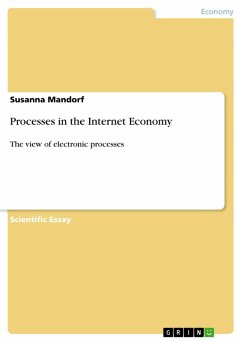
Transnational Organization - Solution for the Multi National Cooperation? (eBook, ePUB)

PAYBACK Punkte
0 °P sammeln!
Essay from the year 2002 in the subject Business economics - General, Mälardalen University (Institution of Economics), course: International Business, language: English, abstract: 1.1. Problem Background International companies are confronted with major organizational problems as they often have to manage a complex system of subsidiaries and at the same time need to respond to the demands of economic and political forces. The organizational structure of companies get more and more complex. In times of falling national growth rates and globalisation1, many companies expand into new markets. T...
Essay from the year 2002 in the subject Business economics - General, Mälardalen University (Institution of Economics), course: International Business, language: English, abstract: 1.1. Problem Background International companies are confronted with major organizational problems as they often have to manage a complex system of subsidiaries and at the same time need to respond to the demands of economic and political forces. The organizational structure of companies get more and more complex. In times of falling national growth rates and globalisation1, many companies expand into new markets. This global expansion trend can be seen by the intensive growth of foreign direct investment outflows in the last ten years.2 Philips, for example, has build up a huge network of subsidiaries in 60 countries.3 As companies expand, the flow of goods, resources and information among organizational units rapidly increases4, and it becomes more and more complicated to manage, control and learn from subsidiaries. Demands on companies have also changed as "economic and political imperatives are rising simultaneously in opposite directions"5. Economic forces lead towards globalisation demanding minimized unit costs while political forces ask for national responsiveness as a result of protectionism for local economies.6 Today, companies are confronted with the demands of efficiency and responsiveness at the same time.7 1.2. Aim of the paper In the following paper, I will analyse Bartlett and Ghoshals' transnational solution as a means to cope with the complex organization and conflicting demands on Multinational Cooperation (MNC), and focus my discussion on advantages and problems from a control perspective. 1 Donaldson (2002), p.13. 2 Hill (2001), p. 183. 3 Goshal/Bartlett (1990), p. 77 [Art. 22]. 4 Bartlett/Ghoshal (1987). p.47 [Article 12]. 5 Martinez/Jarillo (1989), p. 500 [Article 23]. 6 Hill (2001), p. 386. and Bartlett/Ghoshal (1987). p.9 [Article 11]. 7 Bartlett/Ghoshal (1987). p.10 [Article 11].
Dieser Download kann aus rechtlichen Gründen nur mit Rechnungsadresse in A, B, BG, CY, CZ, D, DK, EW, E, FIN, F, GR, HR, H, IRL, I, LT, L, LR, M, NL, PL, P, R, S, SLO, SK ausgeliefert werden.













